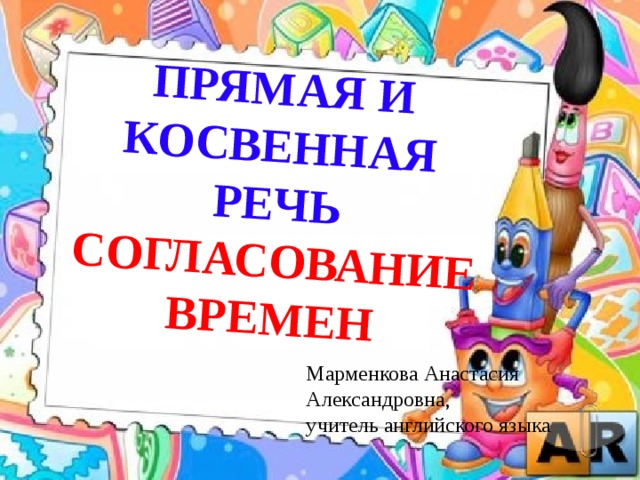
ПРЯМАЯ И КОСВЕННАЯ РЕЧЬ
СОГЛАСОВАНИЕ ВРЕМЕН
Марменкова Анастасия Александровна,
учитель английского языка
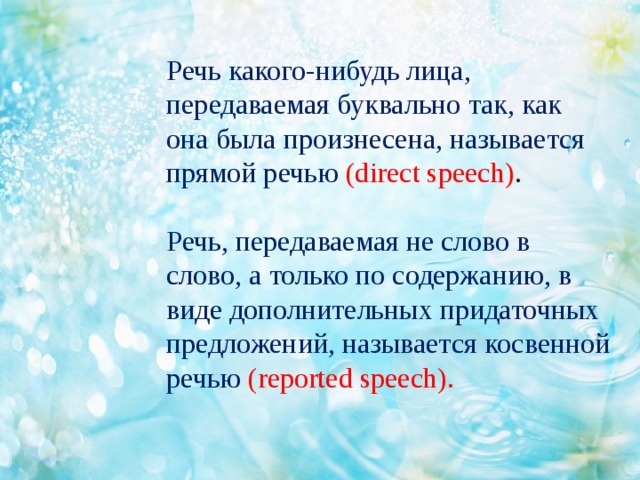
Речь какого-нибудь лица, передаваемая буквально так, как она была произнесена, называется прямой речью (direct speech) . Речь, передаваемая не слово в слово, а только по содержанию, в виде дополнительных придаточных предложений, называется косвенной речью (reported speech).
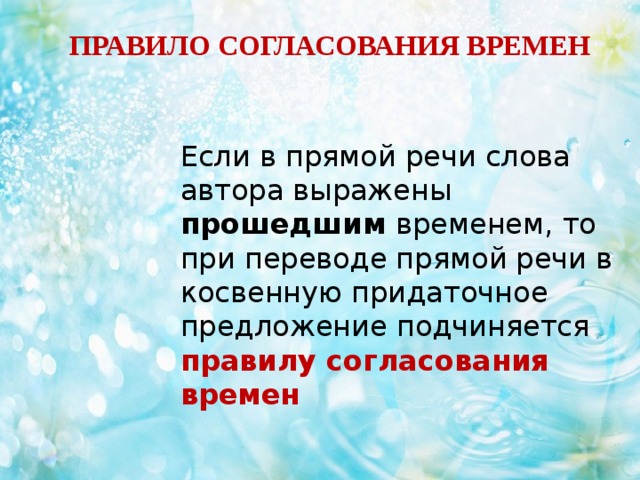
ПРАВИЛО СОГЛАСОВАНИЯ ВРЕМЕН
Если в прямой речи слова автора выражены прошедшим временем, то при переводе прямой речи в косвенную придаточное предложение подчиняется правилу согласования времен
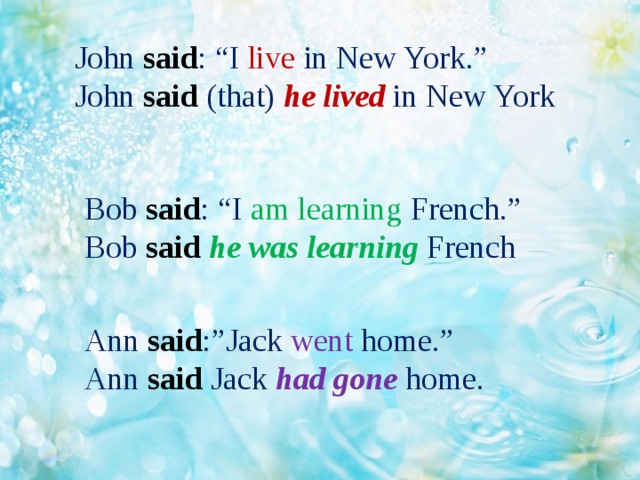
John said : “I live in New York.” John said (that) he lived in New York
Bob said : “I am learning French.” Bob said he was learning French
Ann said :”Jack went home.” Ann said Jack had gone home.
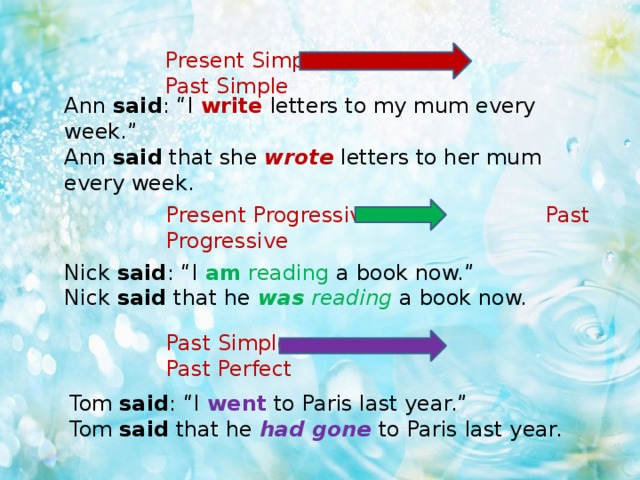
Present Simple Past Simple
Ann said : “I write letters to my mum every week.”
Ann said that she wrote letters to her mum every week.
Present Progressive Past Progressive
Nick said : “I am reading a book now.”
Nick said that he was reading a book now.
Past Simple Past Perfect
Tom said : “I went to Paris last year.”
Tom said that he had gone to Paris last year.
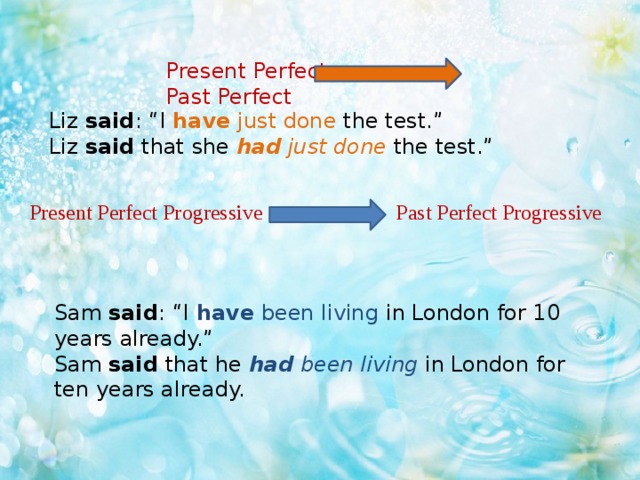
Present Perfect Past Perfect
Liz said : “I have just done the test.”
Liz said that she had just done the test.”
Present Perfect Progressive Past Perfect Progressive
Sam said : “I have been living in London for 10 years already.”
Sam said that he had been living in London for ten years already.
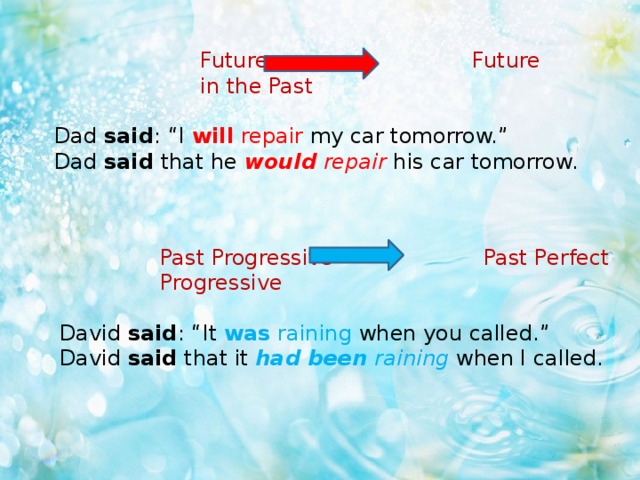
Future Future in the Past
Dad said : “I will repair my car tomorrow.”
Dad said that he would repair his car tomorrow.
Past Progressive Past Perfect Progressive
David said : “It was raining when you called.”
David said that it had been raining when I called.
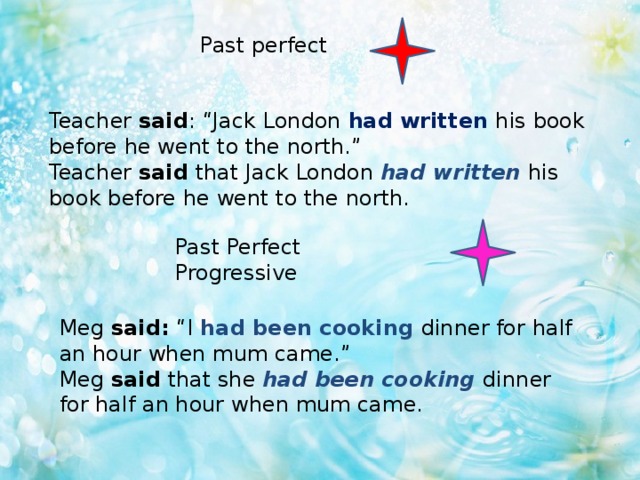
Past perfect
Teacher said : “Jack London had written his book before he went to the north.”
Teacher said that Jack London had written his book before he went to the north.
Past Perfect Progressive
Meg said: “I had been cooking dinner for half an hour when mum came.”
Meg said that she had been cooking dinner for half an hour when mum came.
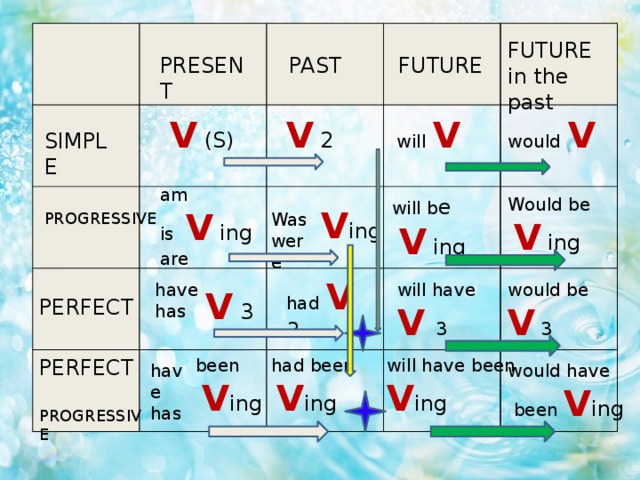
FUTURE
in the past
PAST
FUTURE
PRESENT
V (S)
V 2
will V
would V
SIMPLE
am
is V ing
are
will b e
Would be
V ing
V ing
V ing
PROGRESSIVE
Was
were
had V 3
would be
have
will have
V 3
V 3
has
V 3
PERFECT
will have been
had been
PERFECT
been
V ing
V ing
V ing
PROGRESSIVE
have
would have
has
been V ing
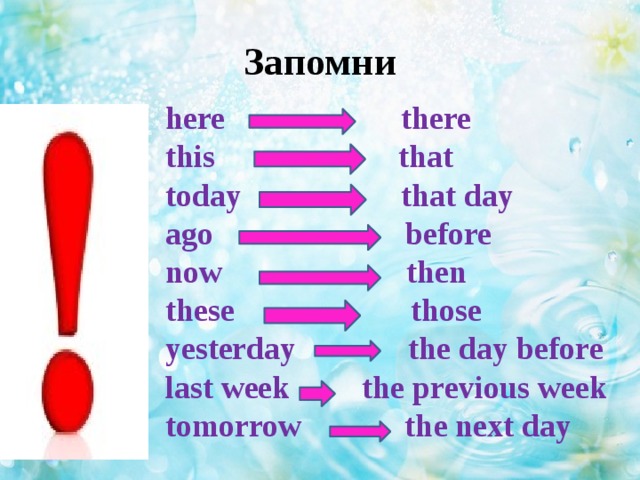
Запомни
here there this that today that day ago before now then these those yesterday the day before last week the previous week tomorrow the next day
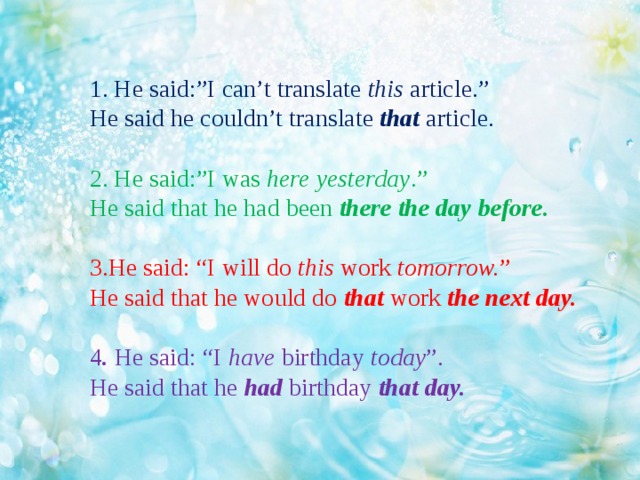
1. He said:”I can’t translate this article.” He said he couldn’t translate that article. 2. He said:”I was here yesterday .” He said that he had been there the day before.
3.He said: “I will do this work tomorrow. ”
He said that he would do that work the next day.
4 . He said: “I have birthday today ”.
He said that he had birthday that day.
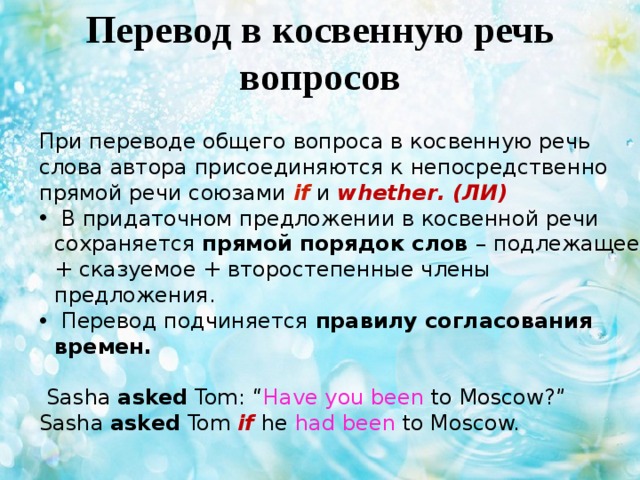
Перевод в косвенную речь вопросов
При переводе общего вопроса в косвенную речь слова автора присоединяются к непосредственно прямой речи союзами if и whether. (ЛИ)
- В придаточном предложении в косвенной речи сохраняется прямой порядок слов – подлежащее + сказуемое + второстепенные члены предложения.
- Перевод подчиняется правилу согласования времен.
Sasha asked Tom: “ Have you been to Moscow?”
Sasha asked Tom if he had been to Moscow.
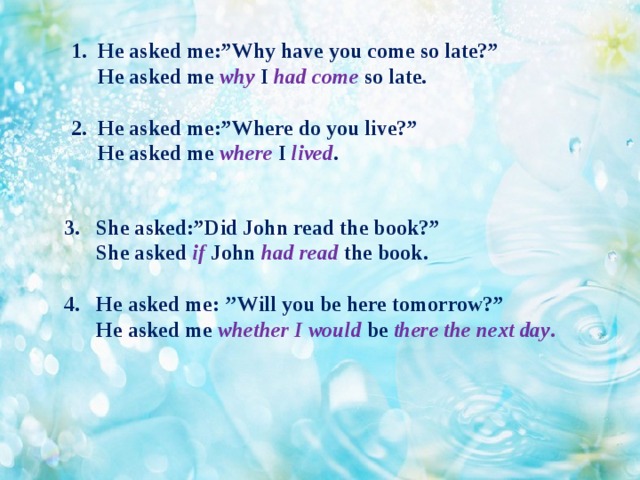
1. He asked me:”Why have you come so late?” He asked me why I had come so late.
2. He asked me:”Where do you live?” He asked me where I lived .
- She asked:”Did John read the book?” She asked if John had read the book.
4. He asked me: ’’Will you be here tomorrow?” He asked me whether I would be there the next day .
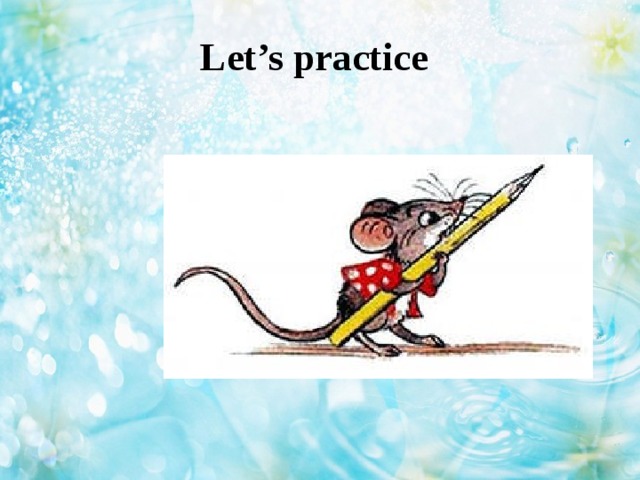
Let’s practice
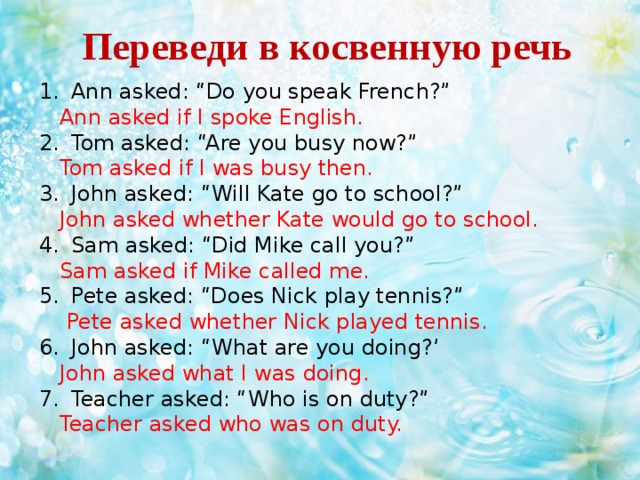
Переведи в косвенную речь
- Ann asked: “Do you speak French?”
Ann asked if I spoke English.
- Tom asked: “Are you busy now?”
Tom asked if I was busy then.
- John asked: “Will Kate go to school?”
John asked whether Kate would go to school.
- Sam asked: “Did Mike call you?”
Sam asked if Mike called me.
- Pete asked: “Does Nick play tennis?”
Pete asked whether Nick played tennis.
- John asked: “What are you doing?’
John asked what I was doing.
- Teacher asked: “Who is on duty?”
Teacher asked who was on duty.
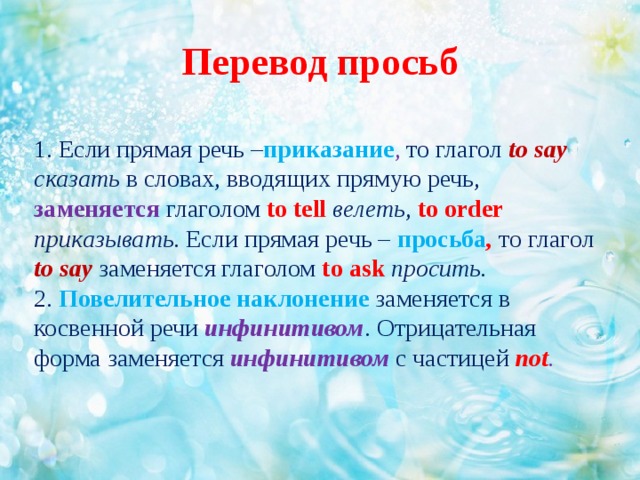
Перевод просьб
1. Если прямая речь – приказание , то глагол to say сказать в словах, вводящих прямую речь, заменяется глаголом to tell велеть , to order приказывать . Если прямая речь – просьба , то глагол to say заменяется глаголом to ask просить. 2. Повелительное наклонение заменяется в косвенной речи инфинитивом . Отрицательная форма заменяется инфинитивом с частицей not .
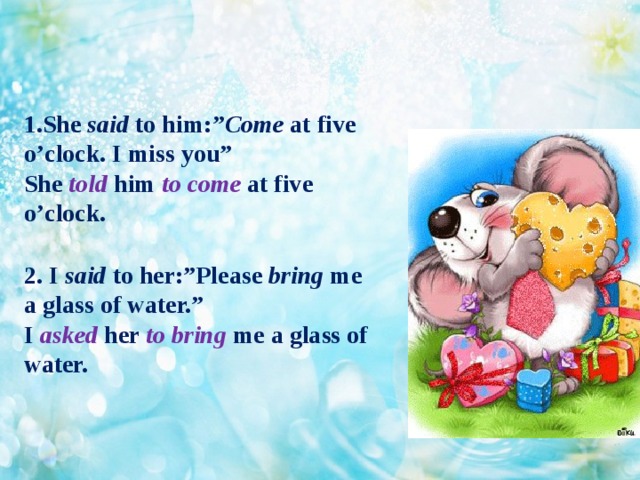
1.She said to him:” Come at five o’clock. I miss you” She told him to come at five o’clock.
2. I said to her:”Please bring me a glass of water.” I asked her to bring me a glass of water.
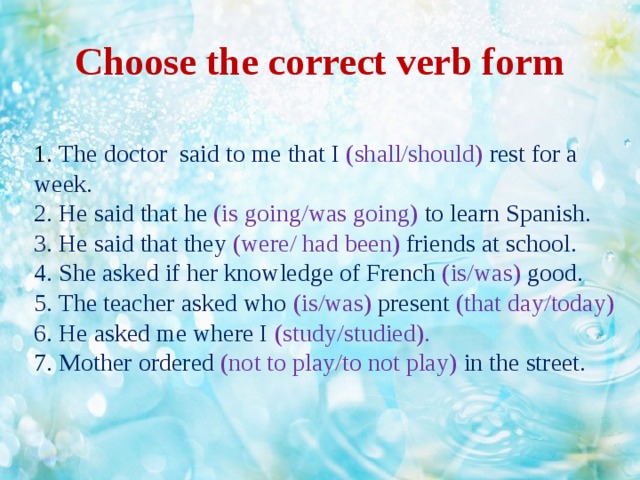
Choose the correct verb form
1. The doctor said to me that I (shall/should) rest for a week. 2. He said that he (is going/was going) to learn Spanish. 3. He said that they (were/ had been) friends at school. 4. She asked if her knowledge of French (is/was) good. 5. The teacher asked who (is/was) present (that day/today) 6. He asked me where I (study/studied). 7. Mother ordered (not to play/to not play) in the street.
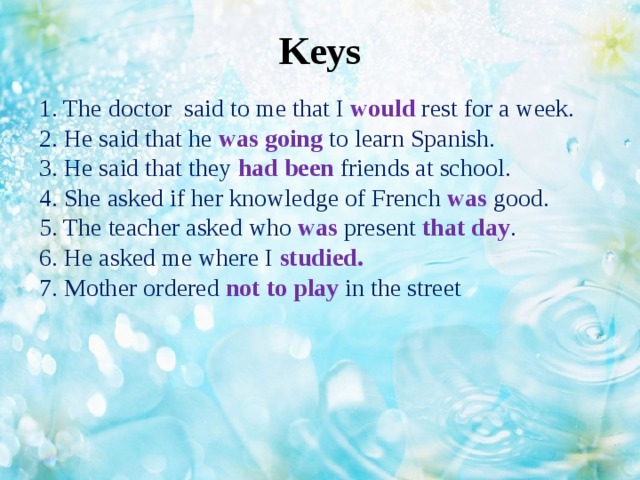
Keys
1. The doctor said to me that I would rest for a week. 2. He said that he was going to learn Spanish. 3. He said that they had been friends at school. 4. She asked if her knowledge of French was good. 5. The teacher asked who was present that day . 6. He asked me where I studied. 7. Mother ordered not to play in the street
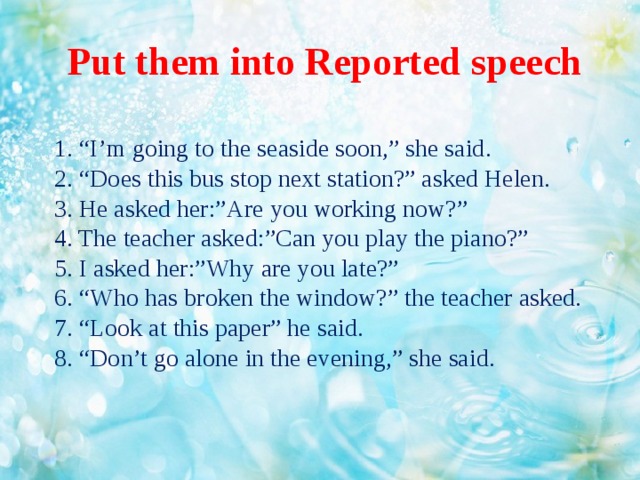
Put them into Reported speech
1. “I’m going to the seaside soon,” she said. 2. “Does this bus stop next station?” asked Helen. 3. He asked her:”Are you working now?” 4. The teacher asked:”Can you play the piano?” 5. I asked her:”Why are you late?” 6. “Who has broken the window?” the teacher asked. 7. “Look at this paper” he said. 8. “Don’t go alone in the evening,” she said.
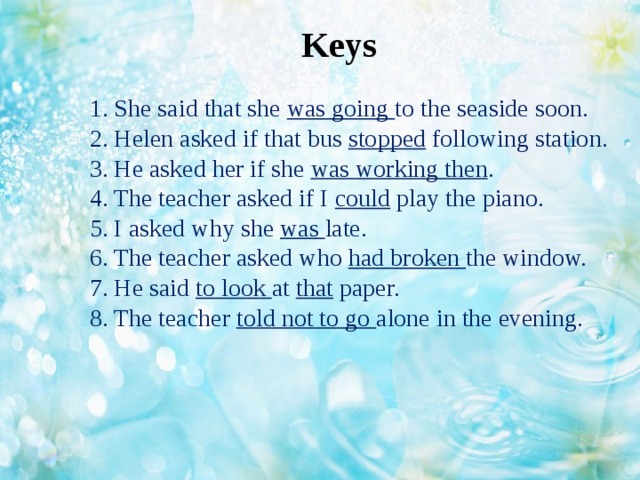
Keys
1. She said that she was going to the seaside soon. 2. Helen asked if that bus stopped following station. 3. He asked her if she was working then . 4. The teacher asked if I could play the piano. 5. I asked why she was late. 6. The teacher asked who had broken the window. 7. He said to look at that paper. 8. The teacher told not to go alone in the evening.
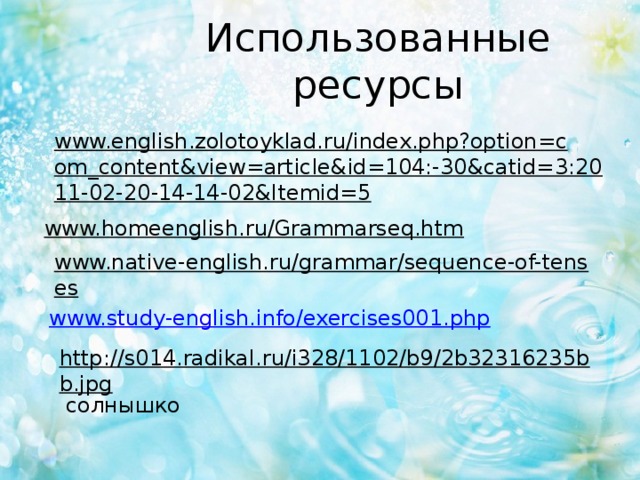
Использованные ресурсы
www.english.zolotoyklad.ru/index.php?option=com_content&view=article&id=104:-30&catid=3:2011-02-20-14-14-02&Itemid=5
www.homeenglish.ru/Grammarseq.htm
www.native-english.ru/grammar/sequence-of-tenses
www.study-english.info/exercises001.php
http://s014.radikal.ru/i328/1102/b9/2b32316235bb.jpg солнышко

http://img10.proshkolu.ru/content/media/pic/std/4000000/3169000/3168723-ff57a9270fed6cc7.gif мышонок
http://us.cdn2.123rf.com/168nwm/frenta/frenta0811/frenta081100140/3913460-exclamation-mark-of-red-color--objects-over-white.jpg восклицательный знак
http://www.modernlib.ru/books/suteev_vladimir/mishonok_i_karandash/i_003.png мышонок с карандашом
http://arstyle.org/uploads/posts/2009-12/thumbs/1261884906_1255458135_3-kopiya.jpg титульная рамка
http://www.wiki.vladimir.i-edu.ru/images/4/4f/0_c8e_d3c8012b_XL.jpeg фон









































